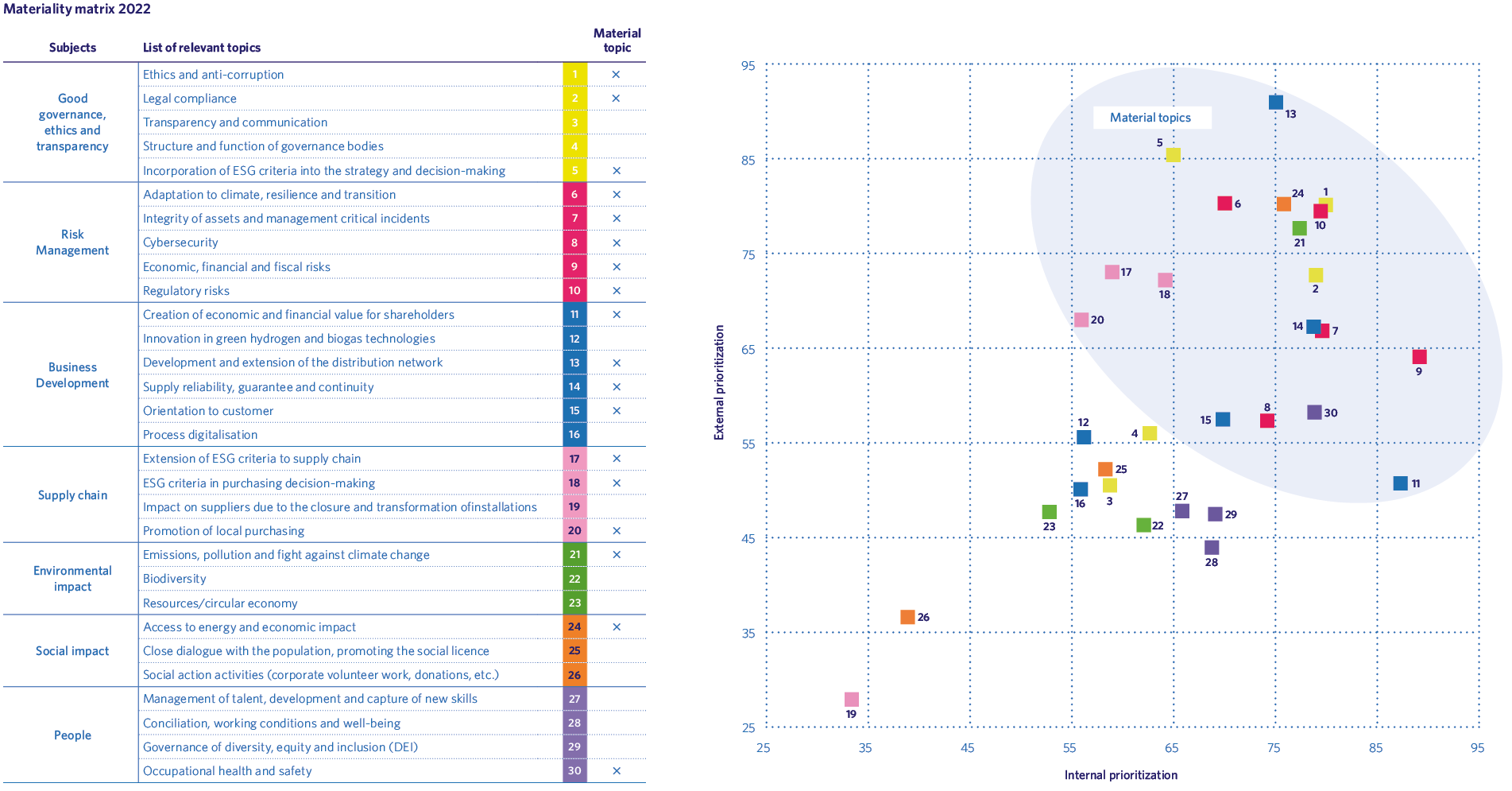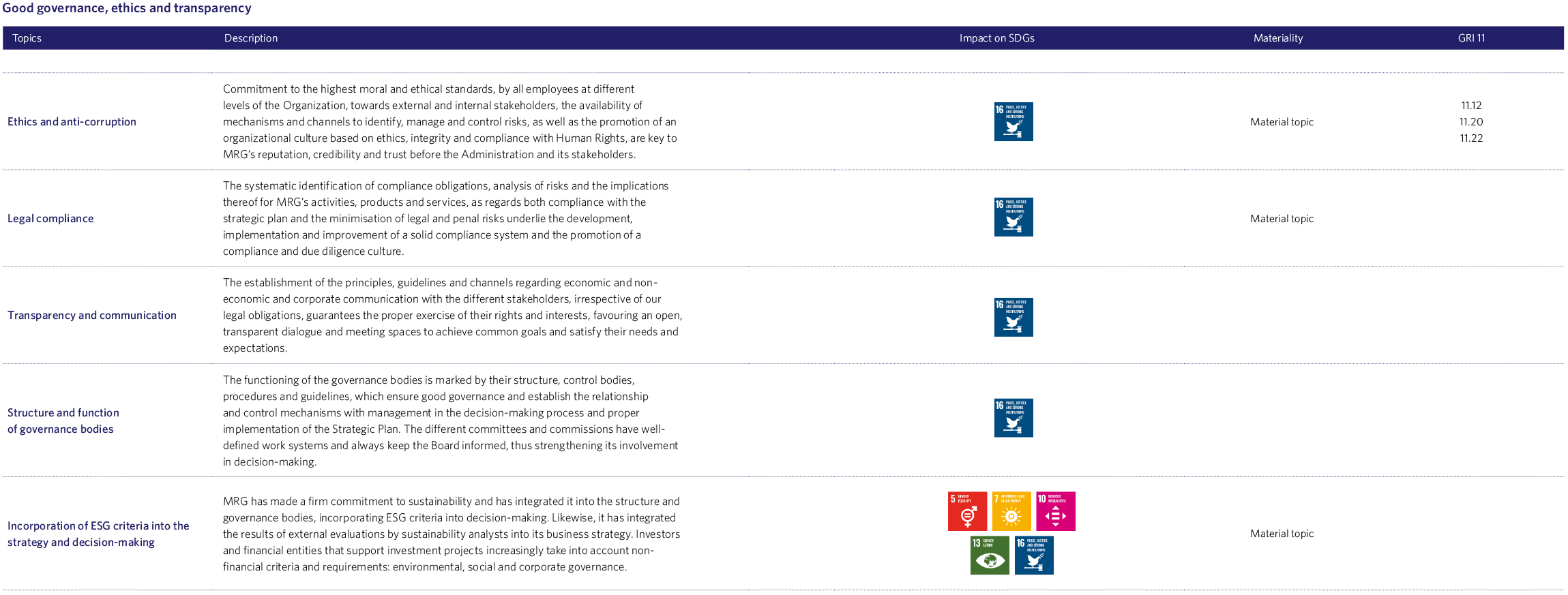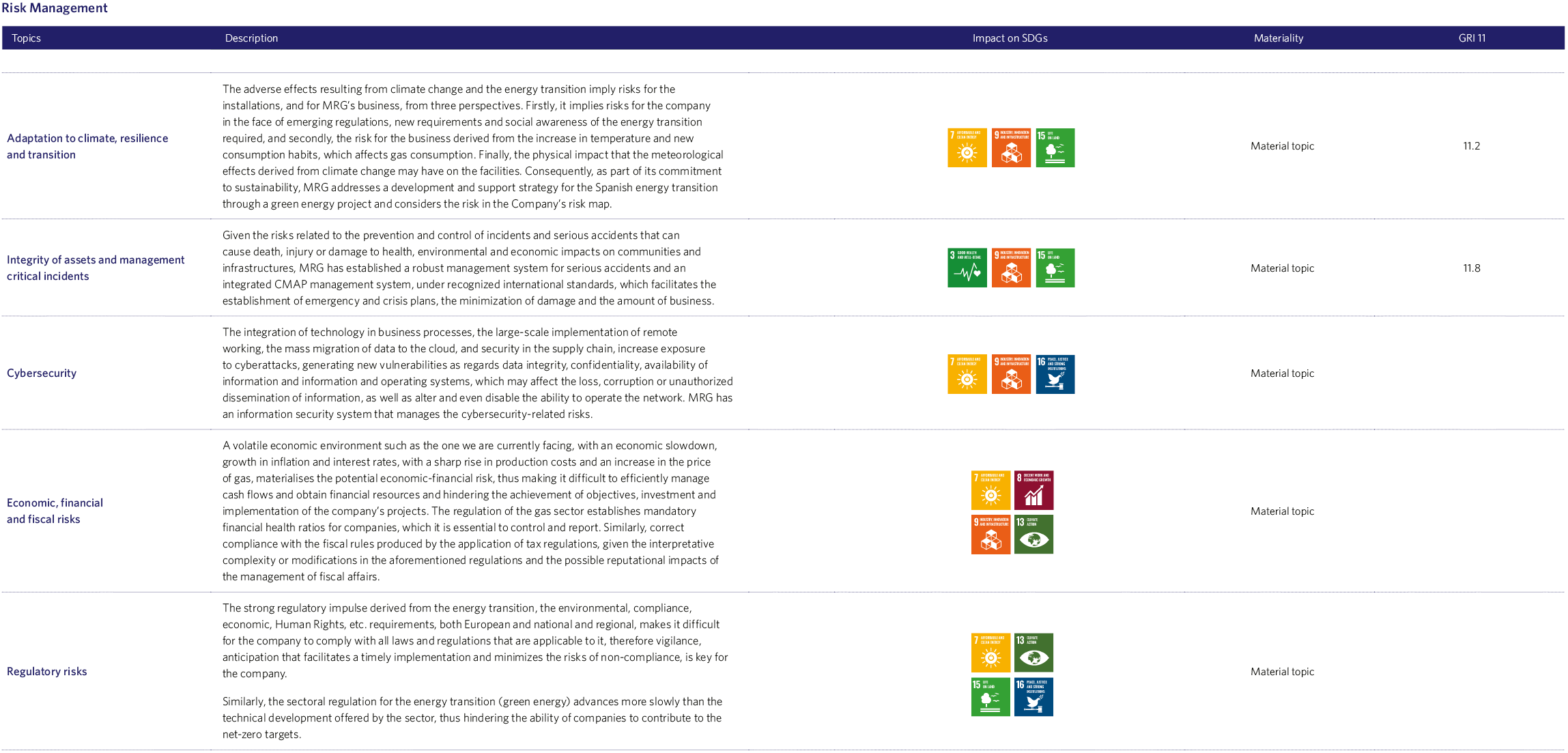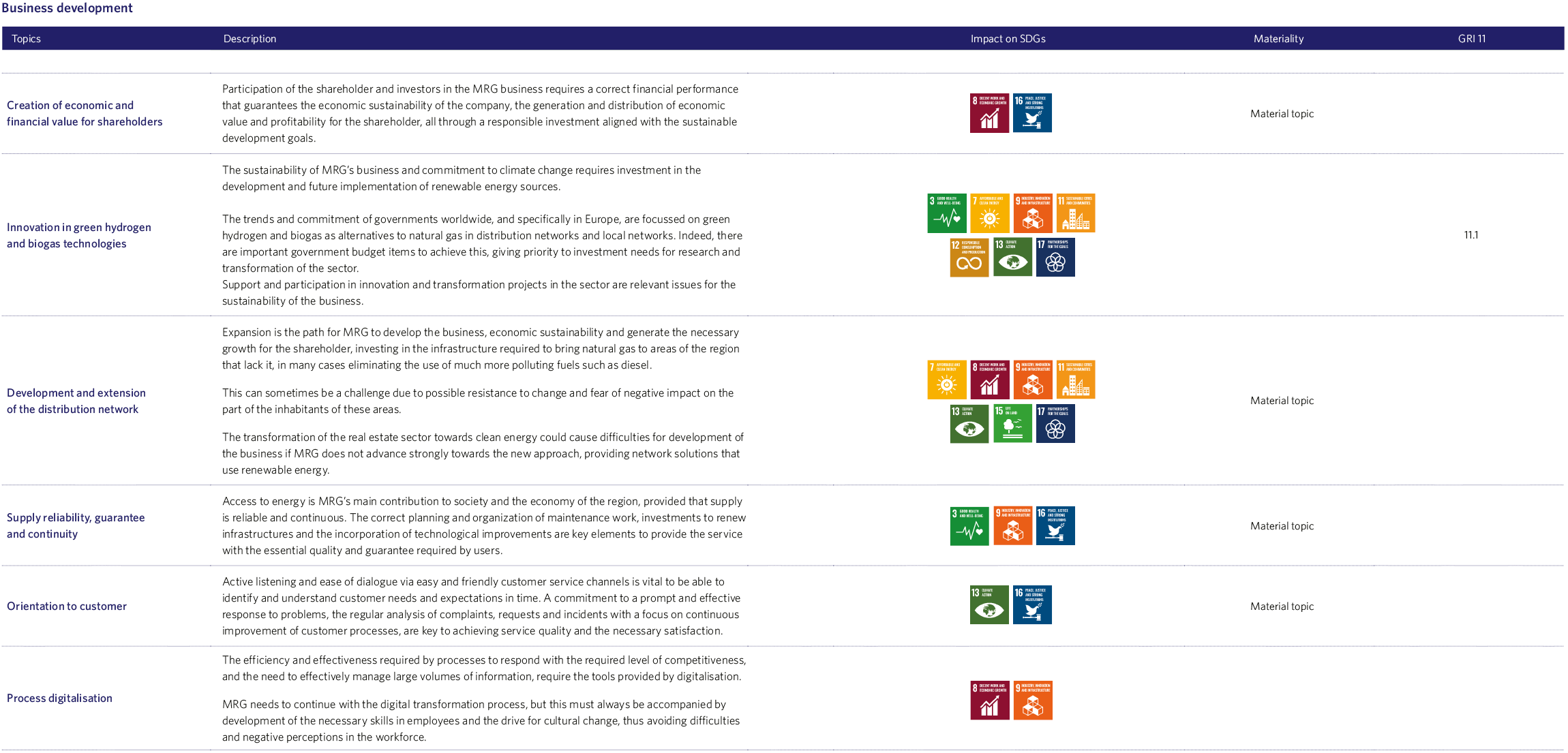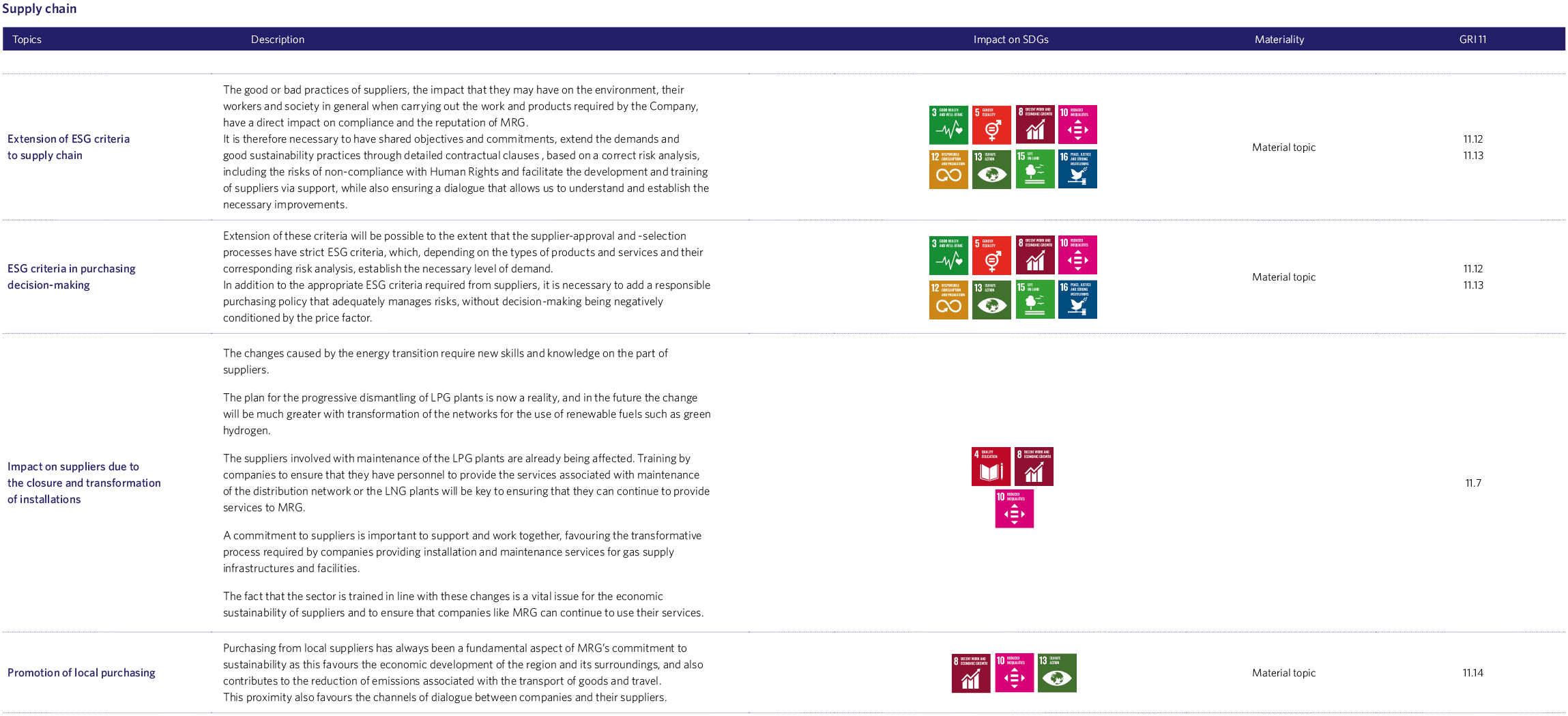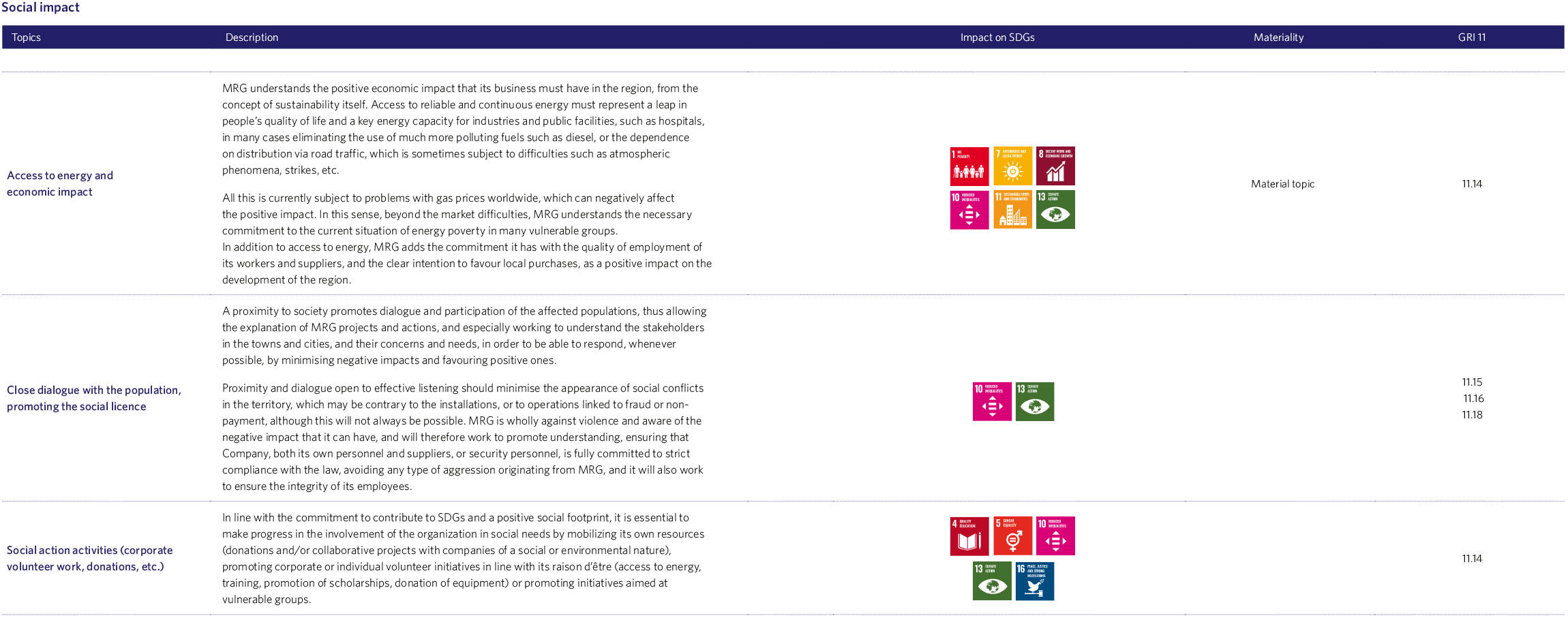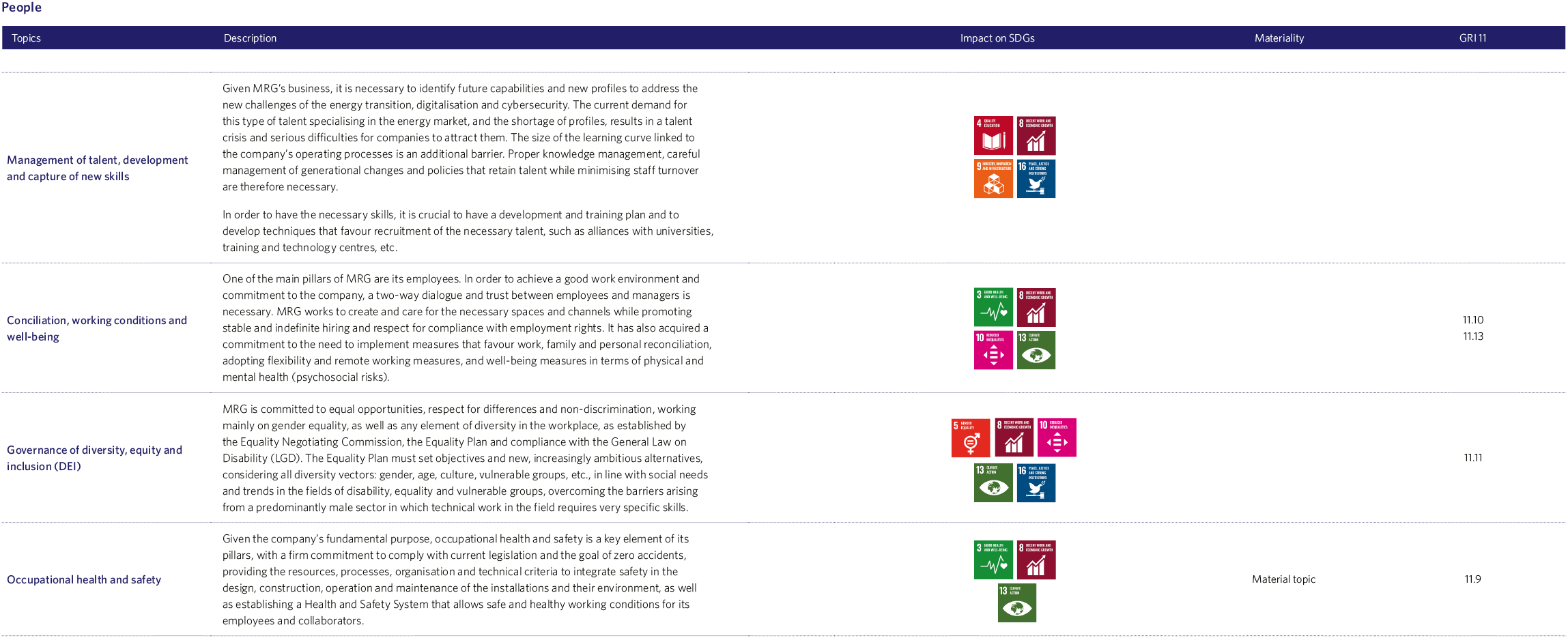4.1 Main milestones 2022
A series of important milestones have been reached by Madrileña Red de Gas in 2022 to continue advancing in our sustainability strategy.
- An in-depth review of material aspects, using the new standards and increasing stakeholder participation.
- Analysis of our capacity to impact the 2030 Sustainable Development Goals, identifying our priority SDGs.
- Definition and implementation of new policies, together with the review of existing ones, with the aim of growing and strengthening our commitment to material issues
- Review of the Mission, Vision and Values Statement, as well as our Social Responsibility Policy, ensuring the correct inclusion of the rights of stakeholders as regards the protection of data and information, guaranteeing their privacy.
- Review of the Serious Accidents Prevention Policy.
- Information Security Policy
- Cybersecurity Policy and good IT tool use practice
- Digital Deconnection Policy
- Human Rights Policy, by way of which MRG aims to establish our commitment to respect and promote Human Rights, in all our operations and value chain, with special attention to vulnerable groups (approved at the end of 2021)
- Sustainable Purchasing Policy and a new Code of Conduct for Suppliers (approved at the end of 2021).
Policies that complement already consolidated ones, such as those concerning the Environment, Quality, Safety and Prevention, Risks, Anti-corruption, Crime Prevention and Protection of Personal Data.
- We have also completed implementation and certification of the Management System as per ISO Standard 27001.
Once the policies have been approved by General Management, they are implemented by way of an internal dissemination and training program of the entire workforce, taking special care to include them in welcome training and to share them externally via our website (see the People chapter of this report).
As evidence of our effort, as in 2021 we have once again obtained the highest “Five Star” rating in the GRESB 2022 Infrastructure Sustainability Index, with 96 points out of 100, increasing by three points compared with the 2021 evaluation, and obtaining first place as a Spanish gas infrastructure company, thanks to the good performance of practically all the areas evaluated.
Looking back, we are proud of our progress in the development and implementation of our sustainability strategy in recent years, with a clear growth in the ranking since 2021.
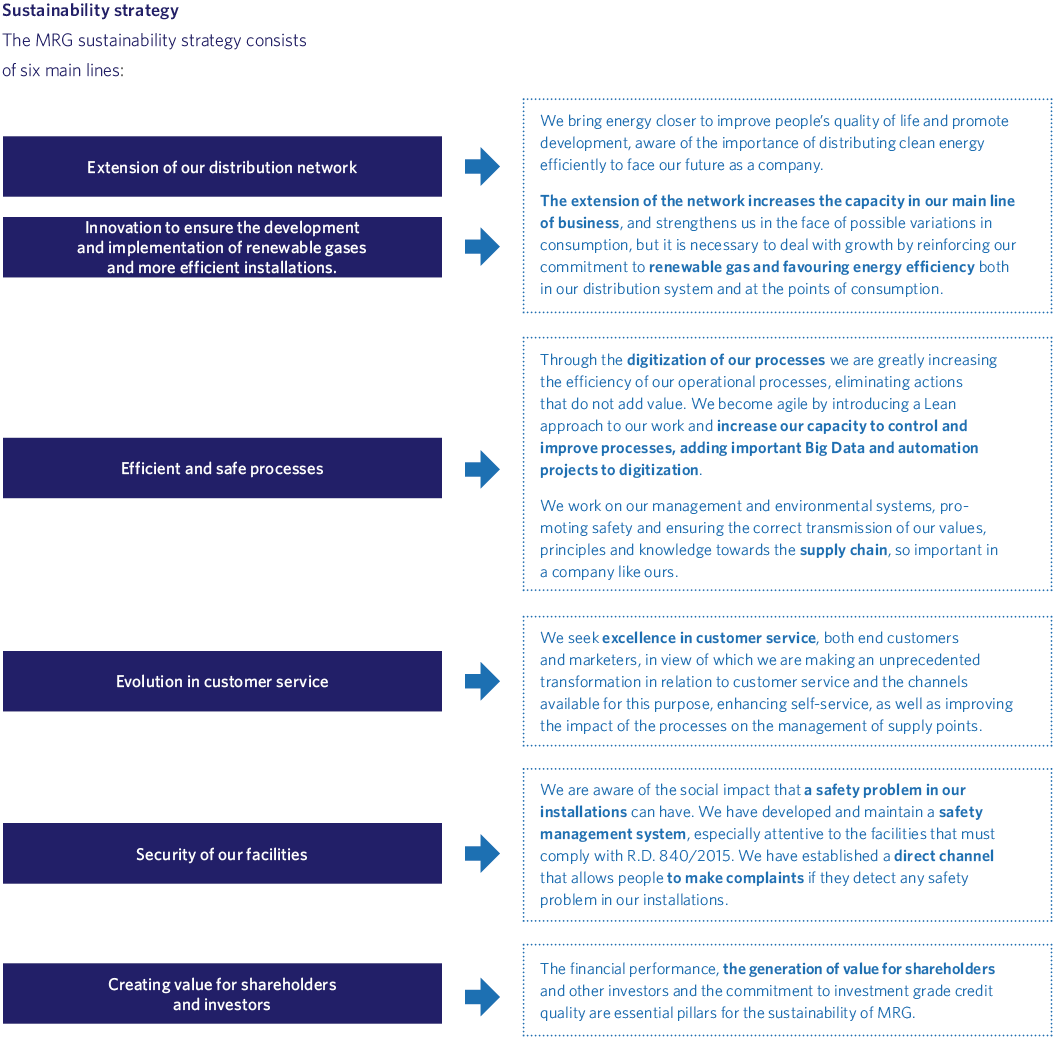
To continue with this focus on commitment and continuous improvement, we have set ourselves the goal of defining an exhaustive Sustainability Master Plan for 2023, with a 2023–2026 horizon, which, taking into account our new materiality matrix, our priority SDGs, trends and the opinion of our stakeholders, will allow us to have a strategy with maximum positive impact.
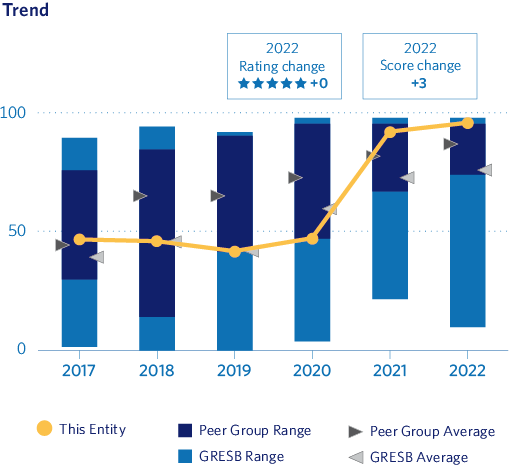
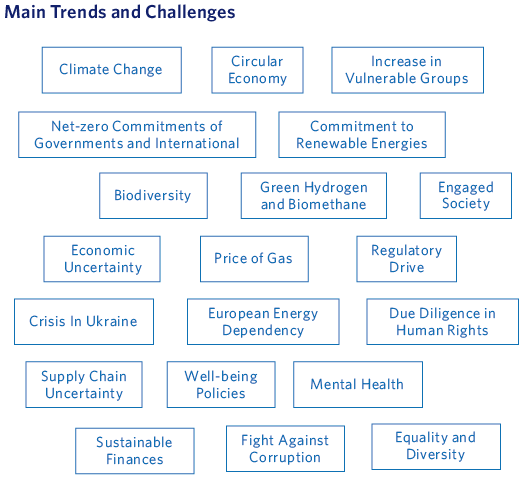
4.2 Materiality analysis
2022 has been important for our materiality review. The need to apply the new standard GRI 3: Material Topics 2021 when identifying and prioritizing issues, reinforcing the concept of impact and introducing the dual materiality approach, together with application of the sector standard GRI 11: Oil and Gas Sector 2021, forced us to carry out an in-depth review of material issues at MRG, if we wanted to continue relying on the standard, to structure and communicate our activity in sustainability. Likewise, although not obligatory in the new European directive for reporting on sustainability, we saw how it focused the analysis of issues under the concept of double materiality, thus reinforcing our idea of review.
As an initial measure, we took an in-depth look what GRI 3: Material Topics 2021 gave us and what implications it may have for our analysis methodology. As a result of that study we made some changes:
- We made an effort to increase the input from stakeholders when it comes to identifying and assessing the impacts by increasing the representation of these different groups in the interview process carried out.
- We defined a new evaluation methodology that incorporates the double materiality approach, thus allowing the evaluation of impacts on the economy, people and the environment caused by MRG’s activity, both positive and negative, real and potential (external evaluation), and the impact that these issues may have on the results and business evolution of MRG (internal impact).
In addition to methodological changes, as always we performed a context analysis, examining the internal and external context.
- To analyse the external context, we examined the global, sectoral and sustainability trends that may be a challenge for MRG, consulting numerous prestigious information sources such as the World Economic Forum (WEF), the International Monetary Fund (IMF), the European Commission and Parliament, World Bank, United Nations Organization (UN) or SEDIGAS. Structuring the result in terms of global and sectoral trends and sustainability.
- For the internal analysis, we analysed our current situation: achievement of objectives, audit results, results in the verification processes for previous reports or the GREBS 2022 evaluation, and especially, we once again visited all the Organizational Units, identifying and examining their concerns and challenges in sustainability.
We also took into account the proposal, which is still unconfirmed, of the next GRESB requirements for 2023, in which two important lines stand out:
- The importance of establishing policies, commitments and plans to achieve the NET-ZERO objective.
- The increased weight of strategies and work regarding diversity, equity and inclusion (DEI).
We analysed sector standard GRI 11: Oil and Gas Sector 2021 in detail with the material topics proposed therein for the oil and gas sector. In general, all the issues proposed in this standard have formed part of the material topics identified and prioritized by MRG in previous analyses, although it is true that in some cases they were considered as part of the issues rather than being identified directly.
The analysis of the sector proposal and GRI 3: Material topics 2021 suggests structuring the materiality at MRG into two levels of categories:
- Material topics: for which the impact as such is analysed.
- Subjects: which bring together topics from the same category.
This allowed us to analyse the possible impacts of each topic much better, and therefore evaluate their priority.
As a result of the analysis of the external and internal context, our Risk Management department drew up a list of relevant subjects and topics. The list is structured into seven subjects:
- Good governance, ethics and transparency
- Risk management
- Business development
- Supply chain
- Environmental impact
- Social impact
- MRG employees
These subjects are broken down into 30 material topics.
This list was subjected to a positive- and negative-impact assessment methodology, applying the double materiality approach and all the recommendations from GRI 3: Material topics 2021, which helped us assess the actual and potential positive and negative impacts on the economy, people and the environment.
In our impact assessment, from MRG outwards, we analysed the positive and negative impacts, considering:
- The importance of the impact (positive or negative) depending on the severity, in the case of negative impacts, or the benefit, in the case of positive ones, multiplied by the probability. To that end, we established a methodology that allowed us to assess the severity or benefit depending on the scale, the scope (on people, the community and the environment), the possibility of remediation and temporality, the damage or benefit, depending on whether the impact is negative or positive.
- In order to prioritize, we added the information obtained from interviews with stakeholders to our impact assessment. Considering both the priority assessment of the groups, as well as the performance, for each of the proposed topics and their contributions when defining and clearly understanding the material topics. A total of 14 in-depth interviews were performed by an external company in order to ensure the free opinion of the participants. These 13 interviews allowed us to obtain the representation of all stakeholders.
With regard to the approach from outwards to MRG, we analysed the possible impacts on the organisation, considering:
- The degree of opportunity to act on the matter (costs vs. benefits).
- The impact on our ability to carry out the Strategic Plan and on our risk management.
- We added the opinion of all the MRG Organizational Units, as well as Union Leaders, on the priority of the issues for MRG and performance to this evaluation.
It is important to point out that the topics indicated by the thematic proposal of the sector standard have mostly been included in the structured list that we have prepared, although, in some cases, it is clearly reflected (as is the case for GRI 11.20. Anti-corruption) in other topics. The proposal GRI 11: Oil and Gas Sector 2021 has been incorporated as part of a higher category, although its inclusion is clear from the very definition of the topics listed, and this has been taken into account during the evaluation and prioritization process.
The three topics proposed by the sector standard that have been left out of our list are:
- GRI 11.17: Rights of indigenous people. The scope of action of MRG, namely the Autonomous Community of Madrid, and the fact that its suppliers are essentially local, means that we consider this material impact to be non-existent.
- GRI 11.19: Unfair competition. As the business of Madrileña Red de Gas is regulated, unfair competition would be directly related to corruption.
- GRI 11.21: Payments to governments. Given the regulations applicable to MRG in Spain, we would again strictly be speaking about corruption.
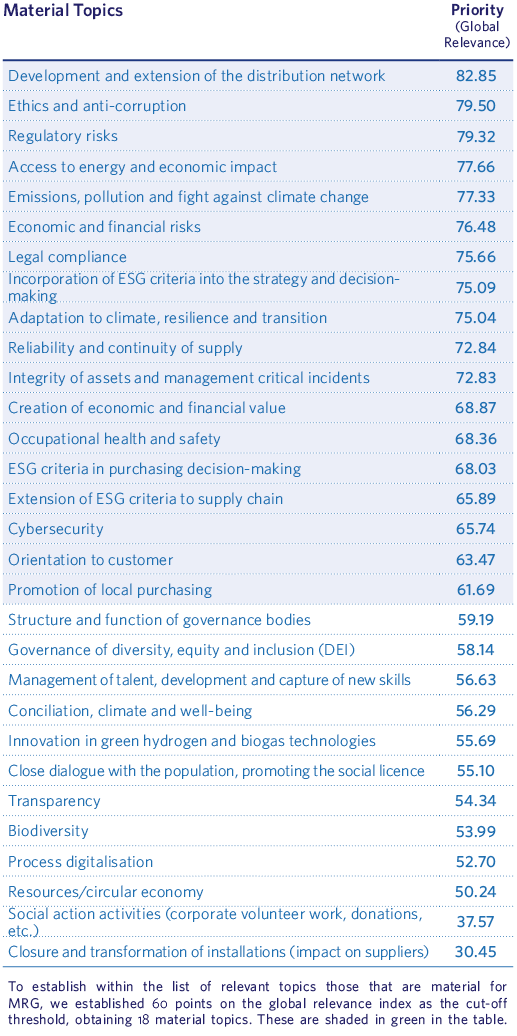
4.3 Identification of significant 2030 Sustainable Development Goals for MRG
In this strategy review process that we started in 2022, we consider it essential to identify the SDGs on which we can have a significant impact, analysing our possible negative impact, in order to minimise it with our strategy, and identifying our capacity for positive impacts to also strengthen said capacity and make a decisive contribution.
To that end, we prepared a simple analysis methodology using the SDG Compass Guide approach. We examined our value chain in detail, analysing the possible impact on each of the targets of the 17 SDGs for each stage of the chain.
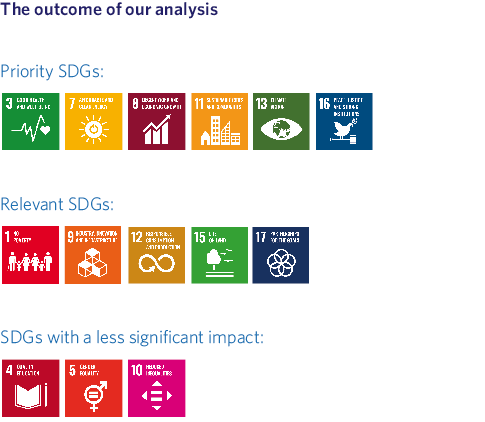
In this analysis, for each stage we evaluated its intersection with the different goals and whether we could speak of very relevant, relevant or insignificant impacts, depending on the scope and intensity of the impact.
Once all the stages of the value chain had been analysed, we identified those SDGs for which we had identified at least one goal for which MRG could impact in a very relevant manner as priorities.
4.4 Commitment with stakeholders
Madrileña Red de Gas identifies its stakeholders, prioritizes them, and designs and establishes mechanisms to identify their needs and expectations, their subsequent evaluation and ongoing improvement. To that end, within its Integrated Management System, it has a procedure approved in 2022, namely PGSG-101, in which it establishes the model.
Madrileña Red de Gas identifies stakeholders based on an analysis of the processes and their interrelation with the different organizational units.
Taking advantage of the meetings held with the different internal units during the materiality study in 2022, we again reviewed the stakeholders with which we have a relationship and the channels via which communication, dissemination and identification of expectations are established; we did not incorporate any new channels with regard to the in-depth work carried out in 2021.
In accordance with our stakeholder model, we have a prioritization methodology that establishes three levels of relevance based on the influence that they may have on our Company and the impact that Madrileña Red de Gas may have on the stakeholder.
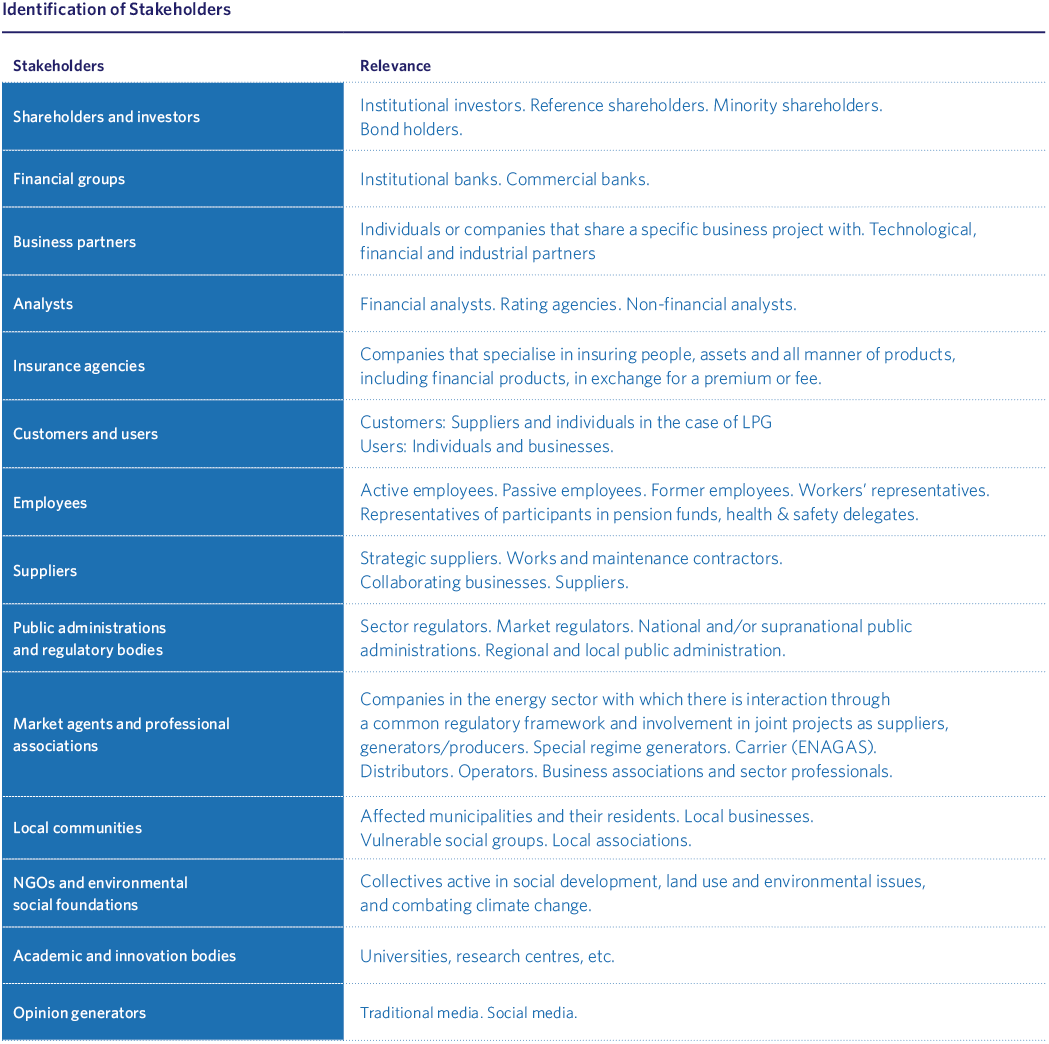
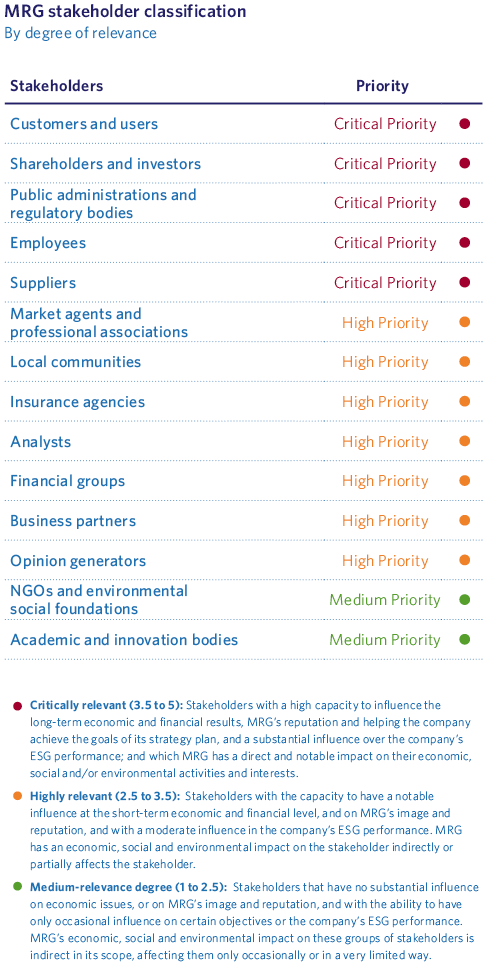
The importance of the participation of stakeholders in MRG activities is evident, as can be seen from the work carried out during the materiality review, with representation from all groups. Outside of this specific activity, and on a day-to-day basis, a two-way dialogue that allows concerns, proposals and unmet needs to be transmitted and collected is established via the different communication channels available (channels included in detail in our 2021 sustainability report).
Our stakeholders model establishes our commitments to all stakeholders.
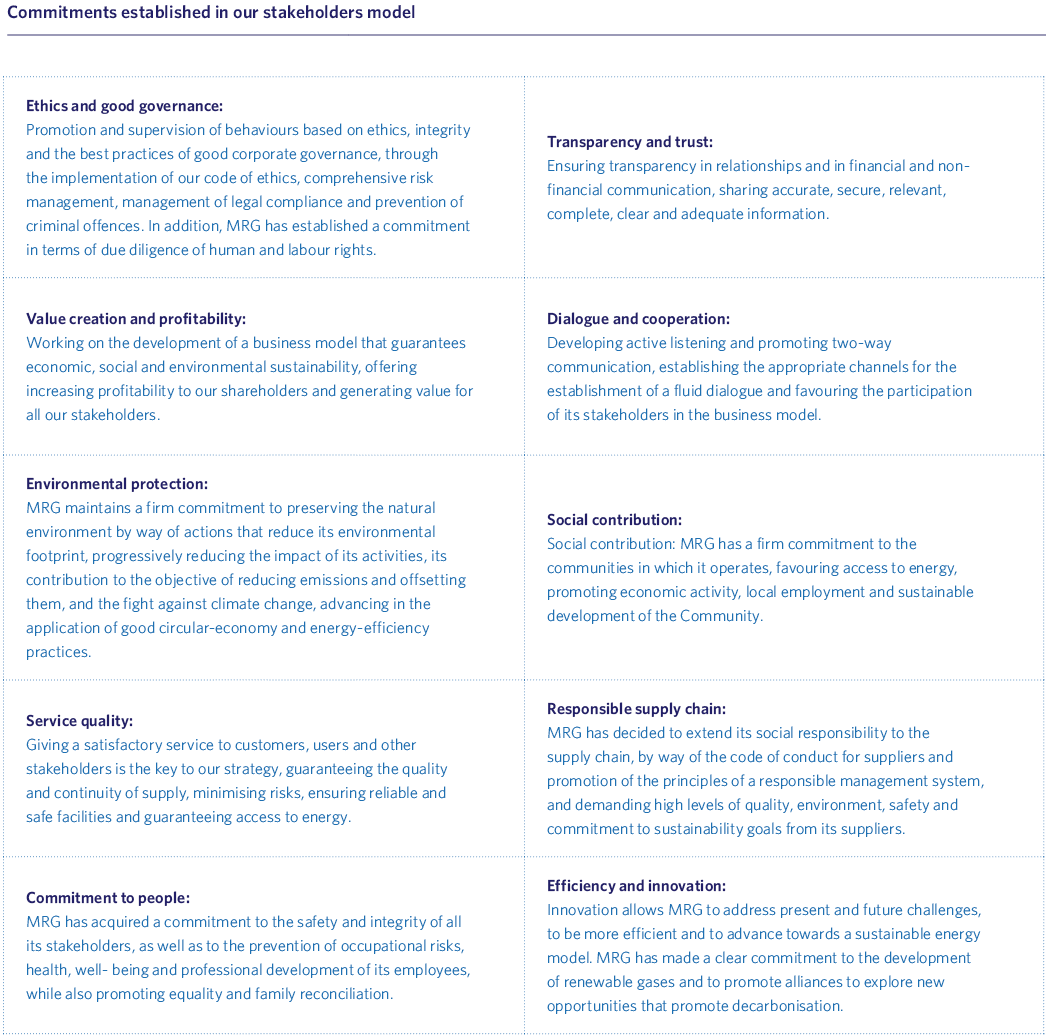
As part of our notable efforts in 2022, we would like to highlight the working environment study, which we discuss in greater detail in the People chapter of this report, in which we wanted to collect, via the participation of our employees, their perception of the working climate and health at MRG and identify the unmet needs that may improve their quality of life and well-being when performing their duties. This study allowed us to draft an action plan. It is a clear and mutually beneficial effort as their satisfaction helps us to have committed people and to retain talent.
Similarly, during this year we have carried out a “Customer Experience” study with our marketers. This study was intended to accurately determine their perception of the services provided by Madrileña Red de Gas, to identify and prioritize what is truly important to them and to detect strong points and areas for improvement that, as a whole, would allow us to define an action plan to meet the needs and expectations of these marketers. In-depth interviews with all marketers with whom we work were performed as part of the study.
Similarly, we included a performance assessment in the in-depth interviews carried out to address materiality. The aim of these interviews was to collect both quantitative and qualitative information, thus allowing us to understand stakeholders’ priorities, their performance assessment and include those lines that help us meet their expectations in our future Sustainability Master Plan.
Dialogue with, and the participation of, local communities in our network expansion process is also increasingly important for us. Indeed, its relevance has led us to identify this as a relevant issue in our materiality matrix. Mainly via the citizen service offices of the different town halls, we establish a space that allows us to publicise our expansion projects, learn about and attend to the concerns and needs of citizens, and to this channel we add the channels for requesting information and for lodging complaints and claims on our customer and user portal, which is always open. We believe that we will only obtain the necessary social license by way of dialogue and participation.
Similarly, when dismantling LPG plants, one of the transformation objectives that we have set ourselves is that we always communicate with the neighbourhood communities to inform them of the removal of the facilities and restoration of the land so that it can be used according to their needs.
Finally, we should highlight our participation in different associations and their working groups, which allows us to generate new proposals and joint improvement projects through collaboration and dialogue. Associations such as SEDIGAS, in which we participate in the Sustainability Committee, the Spanish Contracting and Supply Association (AERCE), with which this year we have participated in the conference held in October, or the Association of Installers of Madrid (AGREMIA), which amongst other activities gives us support in training processes. Depending on the interest group, in the different chapters of this report we describe our participation in the different associations or collaboration agreements, such as that signed with PRICONSA to carry out urban projects in which MRG will provide renewable energy.


